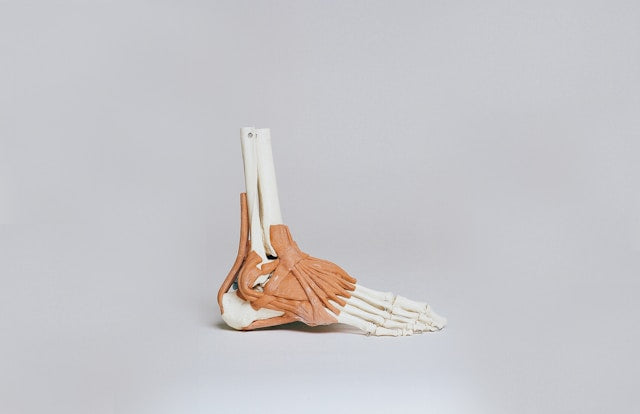This is what you should do if you have an overloaded ankle

The ankle is one of the most stressed joints in our body. Every day, our ankles bear our weight as we walk, run, jump, and stand. It is therefore no surprise that ankle strain is a common problem for both athletes and people who lead an active lifestyle. But what exactly is an ankle strain and how can we prevent and treat it? In this article, we will take a closer look at the causes, symptoms, and treatment of ankle strain.
Overloaded ankle symptoms
An overloaded ankle is a common pain complaint in and around the ankle. If you suffer from overload of the ankle ligaments, you will first experience stiffness during or after movement. The stiffness gradually turns into pain, swelling and sometimes even reduced mobility. Sometimes pain complaints can occur suddenly due to overload. These acute symptoms can be very painful and cause discomfort. In case of persistent complaints, it is therefore advisable to consult a podiatrist.
Causes of an overloaded ankle
Tendon complaints can have multiple causes. This also applies to the ankle tendons. These are common complaints with overloaded ankles:
- Incorrect footwear, which can also contribute to tired feet
- Limited range of motion of the ankle
- Weak muscles
- Overload due to too much exercise
- Hard surface
- Shortened muscles
- Overweight
- Exercising too vigorously without proper build-up
- Do not use warm-up or cool-down
- Incorrect position of the foot, for example due to flat feet
- Ankle instability
- Insufficient cushioning of the heel and sole

What to do about an overloaded ankle?
Do you have an overloaded ankle? What can be done about it? Depending on the cause and severity of the complaints, you can take the following actions:
- Taping an overloaded ankle with kinesio tape for more stability
- Wearing a brace to support the ankle joint
- Cool the ankle after exertion
- Take paracetamol for pain
- Make sure your ankle gets enough rest
- Ensure better structure of your training
- Ankle strengthening exercises
Exercises for an overloaded ankle
You can prevent overloading to some extent by strengthening the tendons in your ankle. A good exercise is to do barefoot or flat shoes. You can choose to walk on your toes. Walk ten steps back and forth and do the exercise three times. Another exercise for an overloaded ankle is to stand on one leg with a slight bend in your knee. This is good for your ankle and for your balance. Make sure you don't sink too deeply through your knee, because then you will overload your knee joint. Do this for about a minute. A final exercise to strengthen your ankles is to do on a step, where you place the front half of your foot on the step, then stand on your toes for five seconds and then lower yourself again until your heel is slightly below the step. Do this exercise for about three minutes.
How long does an overloaded ankle last?
When there is an overload of the ankle, the recovery time depends on the care with which you approach your ankle complaints. For example, how do you adjust your training? How do you perform the ankle exercises? In less serious cases, you should take into account a recovery time of at least three weeks.



Leave a comment
All comments are moderated before being published.